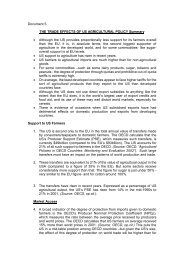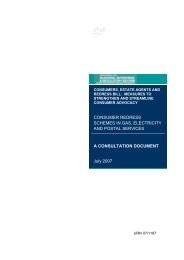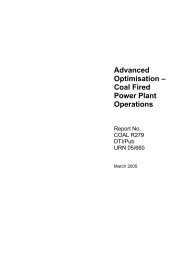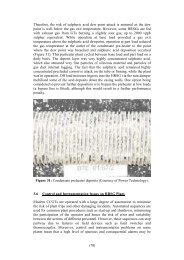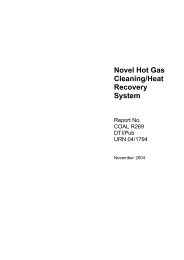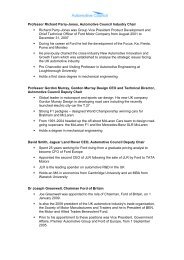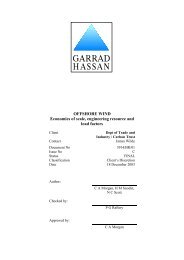Corporate Social Responsibility - A Government ... - DTI Home Page
Corporate Social Responsibility - A Government ... - DTI Home Page
Corporate Social Responsibility - A Government ... - DTI Home Page
Create successful ePaper yourself
Turn your PDF publications into a flip-book with our unique Google optimized e-Paper software.
lead to the identification of resource efficiency savings<br />
which go straight to the bottom line.<br />
Whilst ISO 14001 remains the preferred EMS in the UK<br />
(largely as a result of its global nature), regulators and policy<br />
makers are increasingly showing a preference for the EU’s<br />
Eco-Management and Audit Scheme (EMAS), as it offers<br />
them more transparency, credibility and reliability. For<br />
example, the Environment Agency for England and Wales<br />
now recognises EMAS over ISO 14001 in the way it<br />
regulates industry under its Operator and Pollution Risk<br />
Appraisal scheme (see below).<br />
A new British Standard (BS8555) (www.theacorntrust.org),<br />
designed primarily for SMEs, was published earlier this<br />
year. This allows companies to take a phased approach<br />
to environmental management and can lead to either<br />
certification for ISO 14001 or registration for EMAS and has<br />
been proved to work well in the supply chain, where it can<br />
help companies meet contractual and procurement obligations.<br />
Eco-labelling and the Green Claims Code<br />
By making sure manufacturers and retailers provide<br />
useful and honest information about their products,<br />
consumers will be able to make an informed choice when<br />
buying green. We encourage business to participate in good<br />
green labelling schemes, such as the European Ecolabel,<br />
which we administer and promote in the UK. As well as<br />
a Shopper’s Guide to Green Labels to help consumers<br />
identify good green labels, we have launched Pitching<br />
Green, an electronic newsletter for business covering<br />
all aspects of using green claims and labels.<br />
The Green Claims Code sets out the principles businesses<br />
should follow and promotes good practice. To complement<br />
the code, in 2003 the <strong>Government</strong> produced detailed<br />
guidance for businesses on how they can make good<br />
environmental claims. Drawing on ISO 14021 and the<br />
existing Code, ‘Green Claims Practical Guidance’, along<br />
with 5 more detailed notes for specific sectors, provides<br />
user friendly guidance for business.<br />
www.defra.gov.uk/environment/consumerprod/index.htm<br />
Flexible framework<br />
Environmental legislation has developed significantly in<br />
recent years, including introduction of major new regulatory<br />
regimes such as Pollution Prevention and Control (PPC).<br />
In England & Wales, the Environment Agency (EA) is<br />
developing new methods of environmental risk screening<br />
and targeting of regulatory effort based on the Better<br />
Regulation principles. The Agency rolled out new ‘Operator<br />
and Pollution Risk Appraisal’ (OPRA) procedures in April<br />
2003, linking the EA’s regulation of businesses with the<br />
risks – and transparently with the charging scheme.<br />
Businesses operating under the PPC Regulations 2000 as<br />
amended, gain credit for their environmental management<br />
systems (EMAS and ISO 14001). These credits directly<br />
affect the level of charges the business pays, thus<br />
incentivising businesses to take a responsible approach to<br />
their own environmental risk management. In the coming<br />
years the EA plans to extend the framework across the<br />
rest of its regulatory regimes.<br />
A recent review of the Scottish Environment Protection<br />
Agency (SEPA) found that around two thirds of businesses<br />
thought SEPA set fair licence conditions. The review<br />
also concluded that SEPA’s role should not be just about<br />
implementing regulations but that it had an important<br />
strategic role in securing long term improvements in<br />
environmental quality, based on partnership and advocacy<br />
of best environmental practice. SEPA is committed to<br />
maximising transparency in the way it regulates and<br />
charges business. These approaches should allow<br />
businesses to see what benefits regulatory controls are<br />
designed to achieve and provide responsible businesses<br />
with advice on best practice.<br />
19



